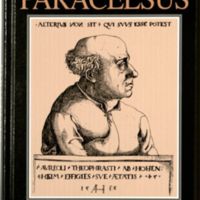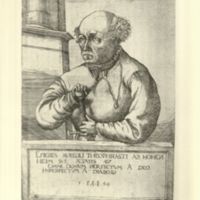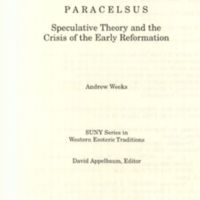Paracelsus: Speculative Theory and the Crisis of the Early Reformation
Dublin Core
Title
Paracelsus: Speculative Theory and the Crisis of the Early Reformation
Subject
Paracelsus, 1493-1541
Philosophy, Renaissance
Europe, German-speaking -- Intellectual life -- 16th century
Philosophy, Renaissance
Europe, German-speaking -- Intellectual life -- 16th century
Description
Paracelsus is regarded as one of the great medical innovators of all time, as a prototype of Goethe's Faust and as a founder of German Renaissance nature philosophy. Recently, his role in the popular "radical Reformation" that coincided with but went beyond Luther's church reform has been recognized as well. A legendary wanderer and rebel, he is an author of undisputed importance, but also one clouded by puzzling ambiguities.
Based on a close examination and revised dating of Paracelsus's writings, this book rejects certain myths concerning the author's scientific orientation and experience of nature. The genesis of his thought is traced to his responses to sectarian conflicts of the early Reformation. One can characterize Paracelsus's project as that of a radical theorist who transgressed the boundaries of disciplines and seized upon the irreducible particularities of his phenomena - the transmuted disease or the unrecognized female pathology - to challenge the established order and ideology.
Based on a close examination and revised dating of Paracelsus's writings, this book rejects certain myths concerning the author's scientific orientation and experience of nature. The genesis of his thought is traced to his responses to sectarian conflicts of the early Reformation. One can characterize Paracelsus's project as that of a radical theorist who transgressed the boundaries of disciplines and seized upon the irreducible particularities of his phenomena - the transmuted disease or the unrecognized female pathology - to challenge the established order and ideology.
Creator
Andrew Weeks
Publisher
Albany : State University of New York Press
Contributor
Edited by David Appelbaum
Relation
Series: SUNY series in Western esoteric traditions.
Text Item Type Metadata
Original Format
Book
Citation
Andrew Weeks, “Paracelsus: Speculative Theory and the Crisis of the Early Reformation,” Humanities Hub, accessed January 12, 2026, https://humanitieshub.sdsu.edu/omeka/items/show/489.



